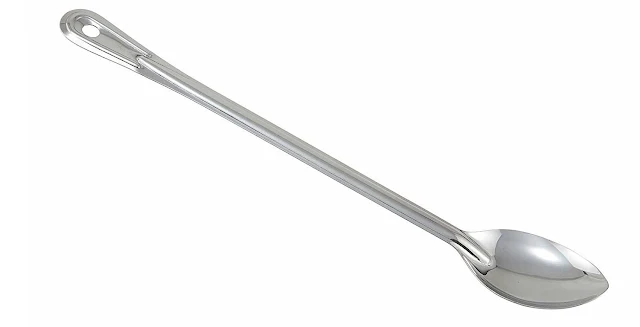Is it a big kettle?
A giant mash tun?
A ph meter?
Those are nice things to have and all but we think the most useful item to have ready to hand on brew day is a spoon.
That’s right, a big spoon.
A big spoon to stir everything up just right. A spoon to unstick a stuck mash tun. A spoon to stir in hops. A spoon to stir in yeast. A paddle to break up clumped together ingredients.
Spoon or paddle, it doesn’t matter but the best ones do have a few factors about them that make them ideal for using on brew day.
They’ve got to be sturdy enough to stir with. Too weak and they’ll snap. This is why some brewers like steel spoons. Many of them have a corrugated design to prevent bending.
The only drawback is the steel can scratch your gear. If that’s a problem for you, use a plastic paddle if it’s strong enough.
If you do choose the plastic fantastic, then ensure it’s food grade quality and that it is resistant to heat.
Some of those brews can get pretty hot so if they are not heat resistant, they are more liable to break. Some smartly designed spoons will have a small head on the top of the spoon which can fit inside the next of a carboy which can be quite handy if you want to mix things up.
Conversely, steel spoons often have a bent top so they may be easily hung up on the side of a kettle or whatever. Else, they will have a hole in the top so they may be hung on a hook.
A great thing about stainless steel spoons is that they are easy to clean and will not retain odour. Handy if you’re also cooking crawfish or doing a turkey in a brewing kettle.
Wooden spoons can snap easily and can carry bacteria. No one wants a wooden spoon eh?
When stirring a mash, some prefer the paddle as they can be more effective in moving the grains around.
You will of course what your brewing spoon to be a long enough length so that it can reach to the bottom of your kettle or drum. To that end, a 21 - 24 inch long brewing spoon should generally see you right for your stirring needs. Such spoons will work best with 4 to 10 gallon size brewing kettles.
As with all brewing equipment, you should only use a spoon that is clean. It doesn’t need to be sterilized when using before or after the boil as the heat should have killed any microbes that may have been lurking about. If however, you need to stir anything afterwards, then you will need to have sanitized your gear (we totally recommend you use sodium percarbonate for this task). This is especially true if you a simply mixing up a beer kit with some beer enhancer as there won’t be any heat to kill the bigs.
Check out some options on Amazon.
Conversely, steel spoons often have a bent top so they may be easily hung up on the side of a kettle or whatever. Else, they will have a hole in the top so they may be hung on a hook.
A great thing about stainless steel spoons is that they are easy to clean and will not retain odour. Handy if you’re also cooking crawfish or doing a turkey in a brewing kettle.
Wooden spoons can snap easily and can carry bacteria. No one wants a wooden spoon eh?
When stirring a mash, some prefer the paddle as they can be more effective in moving the grains around.
You will of course what your brewing spoon to be a long enough length so that it can reach to the bottom of your kettle or drum. To that end, a 21 - 24 inch long brewing spoon should generally see you right for your stirring needs. Such spoons will work best with 4 to 10 gallon size brewing kettles.
As with all brewing equipment, you should only use a spoon that is clean. It doesn’t need to be sterilized when using before or after the boil as the heat should have killed any microbes that may have been lurking about. If however, you need to stir anything afterwards, then you will need to have sanitized your gear (we totally recommend you use sodium percarbonate for this task). This is especially true if you a simply mixing up a beer kit with some beer enhancer as there won’t be any heat to kill the bigs.
Check out some options on Amazon.
